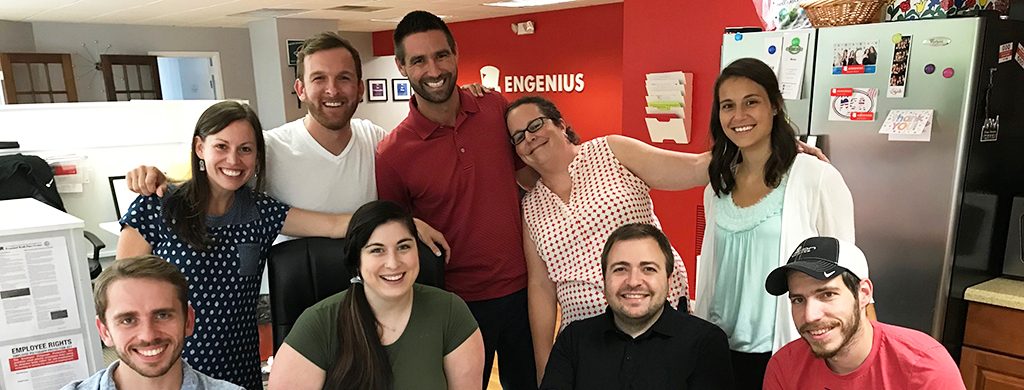Founded in 2008, Engenius is a web design and digital marketing company that places a strong emphasis on proactive and comprehensive WordPress support for their clients, including regular plugin updates, theme updates, WordPress core updates, and a dedicated support team.

The Challenge
At Engenius, we manage more than 165 websites and have between 10 and 15 projects in production at any given time. It’s safe to say that with just 10 team members, most of our bandwidth is dedicated to active projects: strategizing, designing, developing, you name it.
We’re also pretty fanatical about both empowering and supporting our clients. We train all of our clients on how to make changes to their websites, but their service agreement with Engenius also includes access to our dedicated support team for bug fixes, content updates, and more. Our support team takes their job pretty seriously, boasting an average first-response time of under one hour.
But back in 2016, we identified a significant challenge in our model. We weren’t doing a great job of bridging the gap between our meticulous website build process and excellent post-launch support. Our laissez-faire approach to things like theme updates and plugin updates was starting to take a toll: post-launch support tasks were becoming more and more demanding because we weren’t taking crucial steps to ensure things didn’t break in the first place.
Quite frankly, our 10 person team didn’t have the time to execute these updates across 165+ websites. We didn’t have a clear schedule or process. Updates were performed on an as-needed basis so that we could keep our heads above water. We knew we could and needed to do better for our clients.
How ManageWP Helped
ManageWP serves as a comprehensive solution to our once-erratic method of updating our websites. With ManageWP’s all-in-one dashboard we’re able to check for available updates with the click of a button and perform them with one more click. And thanks to the platform’s “tag” feature, we can perform updates proactively while still staying on a schedule that works for our team.
We perform updates in four batches, tackling one batch per week. Each of our team members is assigned a week. Each Monday, the team member assigned to that week’s logs in to ManageWP a syncs our websites for the week to check for updates. We can even automatically filter out plugin updates that don’t apply, like page builders that are packaged within themes. The team member then performs the updates in one fell swoop.
After performing that week’s updates, we do go through and make sure everything went smoothly. We check out each of the sites to make sure everything looks as it should and is functioning appropriately. ManageWP makes this easy, too, as the “Find a Website” dropdown menu makes it simple to open the websites in a new tab and even toggle between WordPress dashboards for each site.
What once would’ve taken us at least one business day each week now takes less than one hour.
What Are The Results
As a result of implementing ManageWP, our clients now experience far fewer issues related to outdated plugins. At one point, our first line of defense on a support ticket was to check and see if the site had any significantly outdated plugins. Now, we know that isn’t the case because plugin updates are taking place on a regular basis. Our clients can rest assured that their site is always up to date thanks to ManageWP.
We save at least 10 hours a month between updating plugins manually and dealing with client site issues due to outdated plugin versions.
Who would you recommend ManageWP to?
We’d recommend ManageWP to any WordPress agencies out there who are managing multiple sites—especially if you want to impress your clients by being proactive, efficient, and thorough in what you do.
